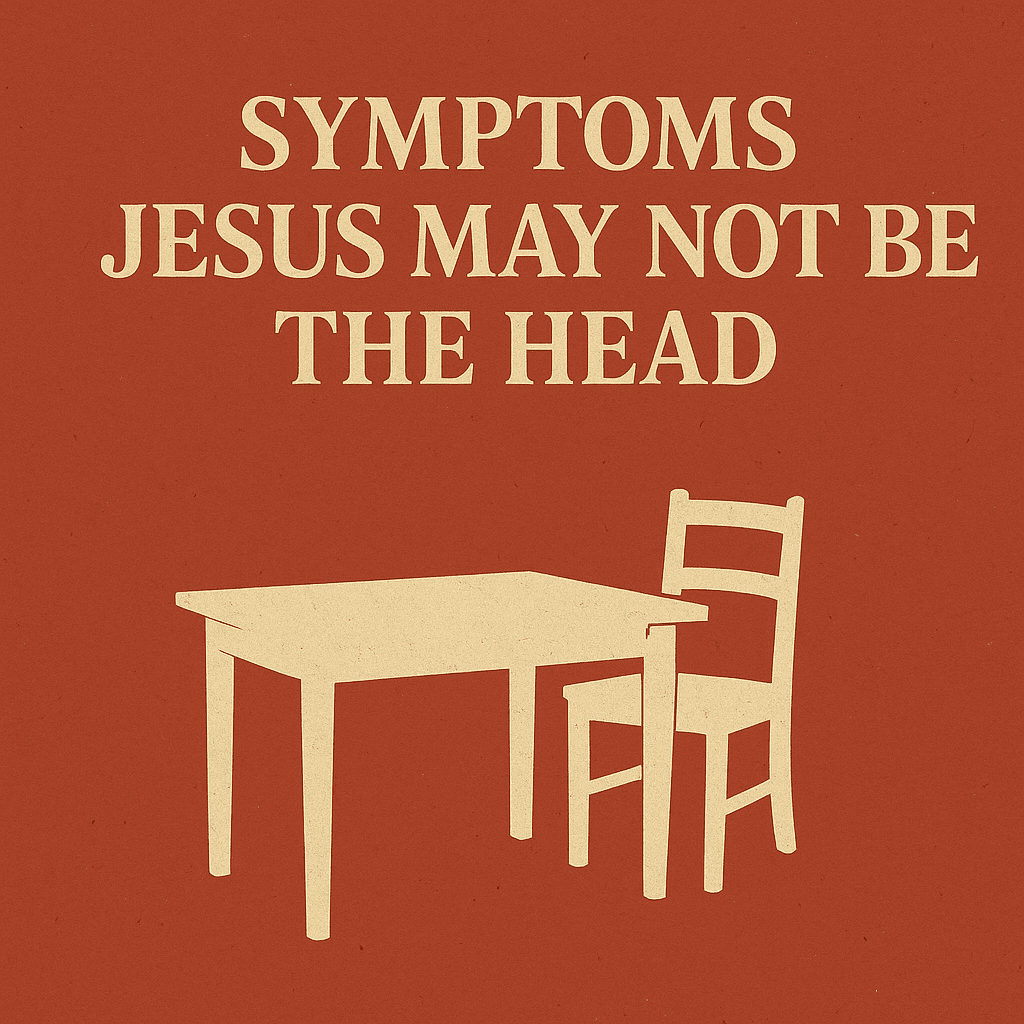
Symptoms that Jesus May Not Be the Head at Your Table of Trust
April 21, 2025
The Table of Trust is one of the most sacred spaces in Kingdom culture.
It’s where discipleship becomes relational.
Where transformation is sharpened by accountability.
Where we exchange isolation for interdependence.
But make no mistake: this table only works when Jesus is truly at the head.
When He's not, it quickly becomes something else:
- A circle of woundedness that never heals
- A spiritualized social club
- A religious system of control
- A mirror of broken family dynamics
So how can we tell if Jesus has been displaced at the Table of Trust?
Let’s explore the symptoms—not to condemn, but to recalibrate.
1. Correction Feels Like Rejection
When Jesus is at the head, correction comes through love and leads to growth.
But when fear or insecurity is at the head, correction feels like personal rejection or exile.
“Beloved friends, if you see a believer who is overtaken with a fault… seek to restore him in the spirit of gentleness.”
—Galatians 6:1 TPT
Symptom: People either avoid hard conversations or deliver them like weapons.
When Jesus is not enthroned, the goal of accountability is control, not restoration.
2. People Hide More Than They Share
At a healthy Table of Trust, people are safe to be seen.
But if self-preservation dominates the culture, people learn to wear spiritual masks—even in discipleship settings.
“Confess and acknowledge how you have offended one another and then pray for one another to be instantly healed…”
—James 5:16 TPT
Symptom: There's no real vulnerability. Everyone is “fine,” and no one is being transformed.
When Jesus is not the head, honesty is replaced by performance, and healing never begins.
3. Authority Is Used to Shut Down Questions
Jesus never rebuked honest questions—He welcomed them. But when Jesus isn’t the Head, insecurity in leadership often silences curiosity.
“Come and learn from me, for I am gentle and humble in heart.”
—Matthew 11:29 TPT
Symptom: Leaders feel threatened by exploration. Questioning is labeled rebellion.
When Jesus is not governing, control becomes the counterfeit covering.
4. Trust Is Measured by Agreement, Not Faithfulness
At the Table of Trust, disagreement can exist within covenant.
But when Jesus isn’t the Head, loyalty is defined as alignment with a personality rather than submission to Christ.
“Speak the truth in love… we will grow up in every way into Him who is the Head—Christ.”
—Ephesians 4:15 TPT
Symptom: If you disagree, you're “dishonoring.” If you see differently, you’re disqualified.
When Jesus is not the Head, unity is confused with uniformity, and covenant becomes conditional.
5. Brokenness Is Managed, Not Healed
The true Table of Trust is a place of ongoing healing, not just behavior modification.
But when trauma governs the table, pain is spiritualized but never brought to Jesus.
“He gave us the ministry of reconciliation…”
—2 Corinthians 5:18 TPT
Symptom: Leaders cycle through burnout. Issues are endlessly counseled but never confronted spiritually. Grace becomes passive.
When Jesus isn’t the Head, wounds are coped with, not delivered from.
6. Spiritual Gifts Are Honored, But Fruit Is Ignored
When charisma is honored above character, the table becomes a platform for gifting, not a crucible for transformation.
“The fruit produced by the Holy Spirit within you is divine love in all its varied expressions…”
—Galatians 5:22 TPT
Symptom: Gifted people are elevated even if their personal lives are out of order. Gifting excuses immaturity.
When Jesus isn’t at the head, talent becomes the leader, and trust turns into a talent show.
7. Confrontation Is Avoided Instead of Stewarded
Healthy tables know how to address tension with honor.
But if fear of man or conflict avoidance sits at the head, confrontation is delayed or detonated, never stewarded.
“If your fellow believer sins against you, go and tell him in private…”
—Matthew 18:15 TPT
Symptom: Passive aggression, unspoken tension, or sudden disconnection replaces open, grace-filled dialogue.
Where Jesus is not governing, people withdraw rather than reconcile.
When Jesus Is at the Head…
- Truth is spoken in love, not in fear
- Correction leads to healing, not exile
- Authority equips, not controls
- Differences strengthen, not divide
- Gifts serve the body, not self
- Pain is brought to the Cross, not buried under spiritual language
Jesus always prepares tables to heal.
He still invites us to come, to be honest, and to become.
So when we sense these symptoms showing up around our Table of Trust, it’s not time to scatter—it’s time to re-surrender.
Not to each other first—but to Him.
Because the safest table on earth is the one where Jesus is leading it.
Support This Ministry
If this content has blessed you, consider partnering with us to reach more lives with the Gospel.
Partner with Us